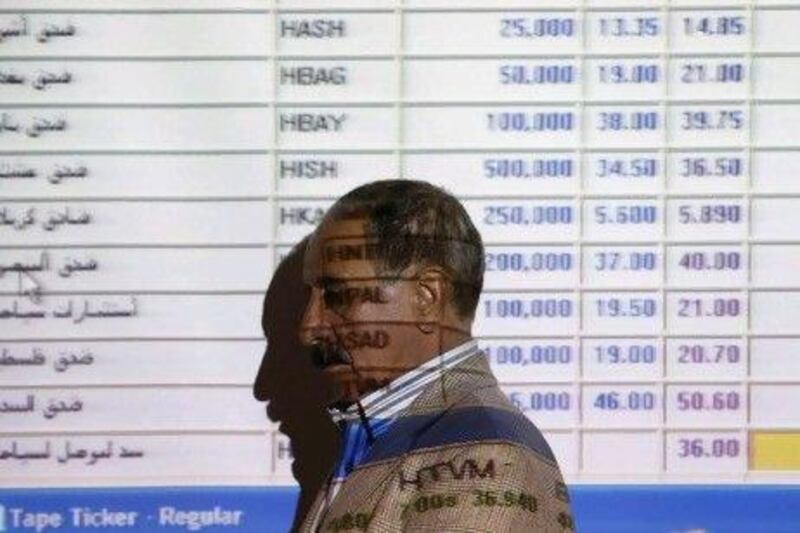The impending withdrawal of US troops from Iraq has prompted "panic selling" on the country's nascent stock exchange, which had previously benefited from seven years of consistent gains.
Finance:
Industry Insights Exclusives you can bank on from The National's premium content. Learn More
The ISX Index has fallen 7.3 per cent since November 1, on course for its first monthly decline since 2004, as foreign investors shed their holdings before the departure of 20,000 US troops due at the end of the year.
"It has been a domino effect for Iraq," said Sherif Salem, who manages the US$20 million (Dh73.4m) Iraq Opportunity Fund at Abu Dhabi's Invest AD.
"Some of the settlements have been related to the general global uncertainty abroad. The foreign outflows have triggered panic selling by local retail investors."
Listings and prices have grown dramatically on Iraq's stock market since the US invasion in 2003, as the previously state-dominated economy opened up to private investment. Shares have risen by more than 40 per cent this year, making it the best-performing Arab market.
Foreign investors have bought 70 billion shares, for the equivalent of $118m, in the first 10 months of the year, betting on Iraqi companies to benefit from double-digit growth.
The economy is benefiting from billions of dollars of infrastructure investment. But the trend has dramatically reversed this month as attention has refocused towards internal domestic security, said Taha Abdul Salam, the bourse chief executive. "Any impact on investment will be short term, assuming the security situation doesn't worsen drastically."
If the main telecommunications companies list on the exchange, he said the market capitalisation would double overnight from its current level of $4 billion.
General Lloyd Austin, the top US commander in the country, on Monday said Iraq could expect "turbulence" as US troops withdrew. Iraqi security forces continue to battle insurgency and bombings and killings still occur on a daily basis, despite a sharp drop in violence from the height of the sectarian conflict in 2006 to 2007.
"Iraq is different today. Iraqis are now driving cars and buying mobile phones," said Ousama Alani, a consultant for Iraqi Islamic Bank and Al Fawz brokerage.
"Nothing has changed fundamentally from a security perspective, it's just investor fear."
The security implications of the US withdrawal are also weighing on the minds of foreign oil companies.
Production from giant fields such as West Qurna and Majnoon have helped the Opec producer increase output to 2.9 million barrels per day (bpd), about half a million below pre-war levels.
But security concerns and inadequate infrastructure represent obstacles to the government's target of 12 million bpd.
Meanwhile, the Iraqi parliament has been slow to pass a national oil and gas law that would provide assurances for foreign investors.
[ halsayegh@thenational.ae ]
twitter: Follow and share our breaking business news. Follow us





